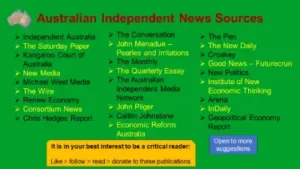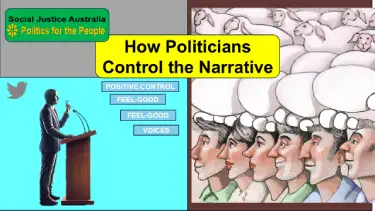Description:
Explore how Australian politicians control narratives on social media. Learn how citizens can demand real engagement for a more democratic society.
Introduction
 In Australia, politicians have harnessed social media platforms, especially Facebook, to craft a carefully curated narrative. While these pages highlight “feel-good” photos and positive achievements, they rarely provide a space for citizens to voice their concerns or discuss pressing issues.
In Australia, politicians have harnessed social media platforms, especially Facebook, to craft a carefully curated narrative. While these pages highlight “feel-good” photos and positive achievements, they rarely provide a space for citizens to voice their concerns or discuss pressing issues.
This deliberate control over political discourse restricts public engagement and diminishes the democratic process. In this article, we will explore the extent of this issue, its impact on public trust and political accountability, and how citizens can demand a more inclusive and transparent dialogue.
Politicians’ Use of Social Media to Control the Narrative
1. The Evolution of Political Engagement on Social Media
Social media has transformed how politicians engage with the public. Platforms like Facebook offer a direct channel to voters, bypassing traditional media filters. This shift allows politicians to promote their agenda without facing real-time scrutiny or opposing viewpoints.
In Australia, this trend is prevalent, with politicians using their pages to highlight accomplishments, share community events, and post personal anecdotes. However, the interaction often stops there—comments are restricted, posts are removed, and citizen posts are often not allowed, creating an echo chamber that amplifies the politician’s voice while silencing the publics.
2. Controlled Narratives and Limited Public Discourse
Politicians’ social media pages are not just for communication; they are strategic tools for controlling the narrative. By restricting public interaction, politicians prevent discussions on contentious issues like housing affordability, climate change, or government corruption from gaining visibility on their pages.
This practice not only stifles public debate but also distorts the political reality presented to followers, portraying an image of widespread support and satisfaction that may not reflect the broader community’s sentiments.
3. Public Relations Over Public Engagement
The focus on keeping a positive image often leads politicians to prioritize public relations over genuine engagement. Posts featuring community events, charity work, or family moments create a personable image but do little to address policy questions or voter concerns. When difficult issues arise, politicians may ignore critical comments or deflect with non-answers, further alienating voters who seek accountability and transparency.
4. The Erosion of Public Trust
This approach erodes public trust, as citizens feel their voices are ignored or marginalized. When politicians do not engage with tough questions or remove critical comments, it signals that they are more interested in preserving their image than in addressing real concerns. This can lead to increased cynicism and disengagement, with citizens feeling that their opinions do not matter in the political process.
5. Case Studies: Controlled Narratives in Action
Several examples illustrate this practice. For instance, during the 2020 bushfire crisis, many Australian politicians focused their social media posts on recovery efforts and community support, while avoiding discussions on the role of climate change or government preparedness.
Similarly, during the COVID-19 pandemic, some politicians were quick to highlight vaccine rollouts and economic support while avoiding debates on border closures or quarantine failures. In both cases, public posts were often restricted, preventing citizens from raising critical questions or expressing dissatisfaction.
Why This Matters to Every Australian
1. The Impact on Democracy
When politicians use social media to control the narrative, it undermines the democratic process. Citizens rely on open communication channels to express their views, ask questions, and hold elected officials accountable. When these channels are restricted, it not only limits public discourse but also reduces the diversity of opinions in political debates, weakening democracy itself.
2. Amplification of Misinformation
By presenting a one-sided view of events, politicians can contribute to the spread of misinformation. Followers who only see positive posts may believe that the politician is universally supported or that there are no significant issues needing attention. This curated reality can mislead the public, especially those who rely solely on social media for political information.
3. Frustration and Disengagement
The inability to engage meaningfully with politicians on social media leads to frustration and disengagement. Citizens who feel ignored or silenced may become disillusioned with the political process, choosing not to vote or take part in community discussions. This disengagement can lead to a cycle where politicians feel less accountable to their constituents, further entrenching the problem.
Reclaiming Public Voice and Political Accountability
1. Organizing Online Campaigns
 Citizens can use social media platforms themselves to organize campaigns that demand transparency and open dialogue from politicians. Hashtags like #LetUsSpeak and #PublicVoice can be used to unify voices and draw attention to the issue. Coordinating efforts across multiple platforms, including Twitter, Instagram, and independent forums, can amplify the message and put pressure on politicians to open their pages to public discourse.
Citizens can use social media platforms themselves to organize campaigns that demand transparency and open dialogue from politicians. Hashtags like #LetUsSpeak and #PublicVoice can be used to unify voices and draw attention to the issue. Coordinating efforts across multiple platforms, including Twitter, Instagram, and independent forums, can amplify the message and put pressure on politicians to open their pages to public discourse.
2. Leverage Alternative Platforms for Open Dialogue
While mainstream social media platforms have their limitations, alternative platforms such as Reddit or specialized forums like Australian Politics on Reddit can serve as spaces for unmoderated discussion. These platforms allow for the free exchange of ideas and can become valuable resources for citizens looking to engage in meaningful political discourse without censorship.
3. Public Petitions and Media Engagement
Public petitions demanding that politicians allow citizen posts on their social media pages can be effective tools for raising awareness. Websites like Change.org and Parliament of Australia Petitions can be used to gather support. Engaging local media to report on these petitions can further amplify the call for more open political engagement. By highlighting the issue in news outlets, citizens can increase public pressure on politicians to change their social media policies.
4. Direct Engagement with Politicians
Although social media offers a convenient way to reach politicians, traditional methods of engagement should not be overlooked. Writing letters, making phone calls, and attending town hall meetings can be effective ways to raise concerns directly with representatives. Citizens can organize group meetings to present their demands collectively, making it harder for politicians to dismiss their concerns.
5. Advocating for Social Media Policy Changes
Social media companies have a role to play in ensuring that their platforms support democratic engagement. Citizens can advocate for changes in platform policies, such as requiring political pages to allow a minimum level of public interaction or providing transparency reports on comment deletions and restrictions.
Platforms like Facebook and Twitter have mechanisms for sending feedback and requests for policy changes, which can be used to push for reforms that support open political dialogue.
6. Creating Community-Led Platforms
To counter the controlled narratives on politicians’ social media pages, communities can develop their own platforms for political discussion and accountability. These platforms, whether websites, podcasts, or YouTube channels, can offer spaces for in-depth discussions on policy issues and allow citizens to voice their concerns without fear of censorship.
7. Supporting Independent Journalism
The Role of Independent Journalism in Political Accountability
 Independent journalism plays a critical role in exposing the truth and holding politicians accountable, especially when mainstream media often prioritizes corporate interests or political alliances.
Independent journalism plays a critical role in exposing the truth and holding politicians accountable, especially when mainstream media often prioritizes corporate interests or political alliances.
In Australia, as in many other countries, mainstream media outlets may limit coverage of certain topics that challenge the status quo, or they may downplay controversial issues affecting powerful figures. Independent media, on the other hand, tends to focus more on investigative reporting, offering deeper insights into political, economic, and social issues without the constraints of corporate funding or political influence.
Independent journalists and smaller media outlets can dive into topics that might be ignored by larger news organizations. Their work shines a light on government policies, corporate interests, and other subjects that have a direct impact on citizens’ lives. Importantly, they can provide a platform for voices that are often marginalized, ensuring that the perspectives of ordinary Australians are heard.
Examples of Independent Journalism in Australia
Australia has a growing number of independent news outlets that prioritize transparency, fairness, and accountability. Some prominent examples include:
– Michael West Media: (https://michaelwest.com.au/)Known for investigative journalism, particularly on issues of government corruption, corporate tax avoidance, and media accountability.
– Independent Australia: (https://independentaustralia.net/)A progressive publication that focuses on social justice, democratic reform, and environmental issues.
– The Saturday Paper: (https://www.thesaturdaypaper.com.au/)While having a more structured approach, it often covers in-depth stories on politics, culture, and society that are overlooked by mainstream media.
– Australian Independent Media: (https://theaimn.com/) The Australian Independent Media Network is a platform for public interest journalists to write and engage in an independent media environment, providing both news and opinion.
These outlets ensure that critical issues are reported and discussed, often filling the gaps left by larger media organizations. By doing so, they empower citizens with the information they need to hold their representatives accountable.
How Citizens Can Support Independent Media
Supporting independent journalism is not just about consuming content; it’s about actively contributing to its sustainability. Here’s how citizens can help:
– Subscriptions and Donations: Independent outlets often rely on subscriptions and reader donations to operate. By subscribing to their newsletters, buying digital or print subscriptions, or making small monthly donations, readers can directly support the work of these journalists. This financial support helps ensure that they can continue their investigative work without being influenced by corporate sponsors or political pressures.
– Sharing and Amplifying Independent Work: Social media platforms are powerful tools for amplifying the reach of independent journalism. By sharing articles, reports, and investigative pieces from independent outlets, citizens can help raise awareness of critical issues. The more people share and discuss these stories, the more likely they are to reach a wider audience, leading to greater pressure on politicians and mainstream media to address these topics.
– Engage with Journalists and Media Outlets: One of the strengths of independent journalism is its accessibility. Many independent journalists are open to feedback, suggestions, and even collaboration with their readers. By engaging with them through comments, emails, or social media, citizens can contribute to the reporting process and help shape the narrative around critical issues.
– Support Investigative Projects: Many independent outlets run specific investigative projects that require more resources. For instance, platforms like GoFundMe or Patreon are often used by independent journalists to raise funds for in-depth investigations. Supporting these projects not only helps journalists dig deeper into important stories but also ensures that complex, long-form investigations—which are resource-intensive—can be completed.
Why Supporting Independent Media Matters
Independent journalism is a cornerstone of a healthy democracy. It ensures that politicians, corporations, and other powerful figures are held accountable for their actions. When citizens support independent journalism, they are contributing to a media landscape that values truth and transparency over profit or political gain.
Independent journalists often face significant challenges, from financial insecurity to legal threats, but with public support, they can continue to pursue stories that truly matter.
Moreover, independent media provides a diversity of perspectives. In a political environment where mainstream outlets may not challenge government narratives, independent journalists offer an alternative voice, one that can help foster informed public debate. This variety of viewpoints is essential for a vibrant democracy, as it allows citizens to make informed decisions based on a wide range of sources.
The Future of Independent Journalism in Australia
The future of independent journalism in Australia depends on citizen support. As digital platforms continue to dominate the media landscape, independent journalists face both opportunities and challenges. While social media and online platforms provide a space for independent voices to thrive, they also bring competition from clickbait-driven content and algorithmic biases that favour sensationalism over substance.
To ensure the longevity of independent journalism, there needs to be a cultural shift towards valuing quality over quantity. Citizens must recognize the importance of paying for good journalism, just as they would for other essential services. This cultural shift can be supported through education, raising awareness about the role of independent journalism in a functioning democracy, and encouraging younger generations to seek out and support diverse media sources.
How Independent Journalism Helps Reclaim Public Voices
One of the most important contributions of independent journalism is that it provides a platform for citizens to express their concerns and highlight issues that mainstream media might ignore. Whether it’s covering grassroots movements, marginalized communities, or controversial political decisions, independent journalists are often the ones bringing these stories to light.
By supporting independent journalism, citizens are indirectly ensuring that their voices, and the voices of those often left out of mainstream conversations, are heard.
In conclusion, supporting independent journalism is not just about access to news—it’s about empowering citizens, holding politicians accountable, and preserving democracy. By subscribing, donating, sharing, and engaging, citizens can help ensure that independent media continues to thrive, offering a crucial counterbalance to the controlled narratives often found in mainstream outlets.
Summary
Social media has become a powerful tool for politicians to control the narrative and limit public discourse. This practice undermines democratic engagement and contributes to public disillusionment.
By organizing campaigns, using alternative platforms, advocating for policy changes, and supporting independent journalism, citizens can demand a more transparent and inclusive political dialogue. Taking these steps will ensure that the voices of all Australians are heard, not just those of the political elite.
Question for Readers
Do you feel that Australian politicians are doing enough to engage with citizens on social media? How can we collectively push for more open and accountable political discourse?
Call to Action
If you believe in the importance of open political dialogue, join us in demanding transparency from our elected representatives. Share this article, take part in online campaigns, and support independent media that holds politicians accountable.
Social Sharing
Share this article with your network and let’s build a movement for more honest and open political engagement in Australia.

